With all of the horse race and insult-related content in the GOP presidential debates, there is a huge opportunity cost: A lot of substantive questions simply are going unasked.
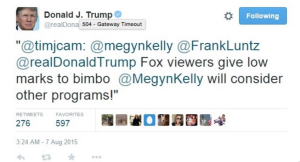 Maybe that’s because reporters are worried bullying candidates will give them the Megyn Kelly Treatment/Rebecca Quick Treatment. Maybe it’s because reporters don’t take the time to learn policy issues. Maybe it’s because reporters don’t respect voters’ intelligence enough to think that they will care about, or understand, policy issues
Maybe that’s because reporters are worried bullying candidates will give them the Megyn Kelly Treatment/Rebecca Quick Treatment. Maybe it’s because reporters don’t take the time to learn policy issues. Maybe it’s because reporters don’t respect voters’ intelligence enough to think that they will care about, or understand, policy issues
Whatever the reason, the most consequential questions simply aren’t being posed, and the result on the Republican side is the most vapid set of presidential debates of my lifetime. Here just a few of the questions that I would love to hear asked at the upcoming Republican debate:
- PAYING FOR TAX CUTS FOR WEALTHY? Which Americans’ services are you going to cut or eliminate to pay for your proposed tax cuts, which go disproportionately to the wealthiest Americans?
- PAYING FOR PENTAGON SPENDING SPREE? You claim President Obama has destroyed the military, despite the fact military spending is at historically high levels, and is 23% higher than under President Reagan. But if you do want to further beef up the military, which specific Pentagon spending programs will you increase, how much will that cost and what service cuts and/or tax increases will you offer to pay for that large increase in spending?
- BUSHONOMICS AGAIN? President George W. Bush’s tax cuts on the wealthy didn’t lead to economic growth and deficit reduction, yet your tax proposal is remarkably similar to the Bushonomics that didn’t turn out so well for Americans. Why do you think that approach will lead to a booming economy if it didn’t turn out that way under the last Republican president?
- CAP-AND-TRADE. One solution for reducing greenhouse emissions is the cap-and-trade approach. The last three Republican Presidents, including conservative icon Ronald Reagan, embraced this market-based approach. But suddenly Republicans now oppose the cap-and-trade approach to protecting the environment. Has cap-and-trade changed since President Reagan, or has the oil industry’s control of Republican leaders gotten that much stronger?
- ELIMINATE OIL COMPANY SUBSIDIES? Given that you oppose subsidizing alternative energy sources, and government spending in general, would you support eliminating the $4.8 Billion in subsidies the petroleum industry is given every year? If not, why give an unfair competitive advantage to dirty, non-renewable, and foreign sources of energy over cleaner, renewable, American-based sources?
- MAKING BANKS SMALL ENOUGH TO FAIL? The largest banks in America are now actually even larger than they were in 2008, when leaders judged them to be too big to fail. Will you break up the nation’s largest financial institutions so that they are no longer “too big to fail?” If not, aren’t you leaving American taxpayers wide open to another crippling bailout?
- DETAILS ON DEPORTATION. Explain specifically how you would deport 11.2 million undocumented immigrants, an amount roughly equivalent to the population of the State of Ohio? For example, how would you pry 11 million people away from their lives and families, and get them onto trains or buses? Would you use the military, National Guard or police? How would you pay the estimated $400-600 Billion cost of deporting 11.2 million people?
- VETERANS VOTING RECORD. You all talk a lot about needing to honor and help military veterans. But if you all love veterans so much, why do groups like the Disabled American Veterans of America (DAV) rate your voting records so low. For instance, the DAV says Senator Rubio and Senator Cruz supported veterans 0% of the time in their most recent rating of them, while Senator Sanders supported veterans 100% of the time and Senator Clinton supported them 80% of the time. Don’t legislative actions speak louder than your words?
- DEFICIT SPENDING FOR WARS? Your comments on foreign policy indicate that you are inclined to send American troops to another armed conflict in the Middle East. If you do, will you increase taxes to pay for those operations, or will you fund the conflict with deficit spending, as the last Republican President did? If you’d run up the deficit with trillions of dollars of war spending, how can you claim to be a fiscal conservative?
- AFFORDABLE CARE ACT (ACA) ALTERNATIVE? What’s your specific plan for replacing the Affordable Care Act? No, really, it’s been six years since the ACA passed, so this time you are not going to get away with dodging the question. If you still can’t name an alternative you support, isn’t it fair to assume that the claimed “repeal-and-replace” rhetoric is actually just “repeal,” which would lead to 1) about 15 million Americans losing their coverage and 2) another 65 million losing their ACA protection from discrimination due to a pre-existing condition?
Oh, and here is one over-arching question I’d like them to add. “For every tax cut or spending increase you didn’t know the cost of today, will you pledge to the American people that you will disclose the estimated fiscal impact within the next month? If not, why won’t you shoot it straight to the voters.”
There are dozens of other questions that need to be asked by reporters, but this would be a very helpful start. Yes, such questioning will cause reporters to get booed, heckled and bullied by the candidates and their cheering sections. But frankly that happens even when they ask softball questions, so what exactly do they have to lose?

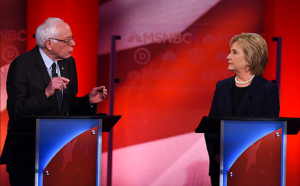 To hear Senator Hillary Clinton’s campaign tell it, you would think that there is absolutely no way to transition from the Affordable Care Act (ACA) world of today to an eventual Medicare-for-All world that her opponent Senator Bernie Sanders promotes.
To hear Senator Hillary Clinton’s campaign tell it, you would think that there is absolutely no way to transition from the Affordable Care Act (ACA) world of today to an eventual Medicare-for-All world that her opponent Senator Bernie Sanders promotes. On March 1, Minnesota’s two major political parties will select its presidential nominees with a caucus system. Iowa will use a similar system in just a few days. So maybe we should take a moment to consider who gets the most and least representation out of this system.
On March 1, Minnesota’s two major political parties will select its presidential nominees with a caucus system. Iowa will use a similar system in just a few days. So maybe we should take a moment to consider who gets the most and least representation out of this system.
 Mamas don’t let your babies grow up to be tea boys.
Mamas don’t let your babies grow up to be tea boys.
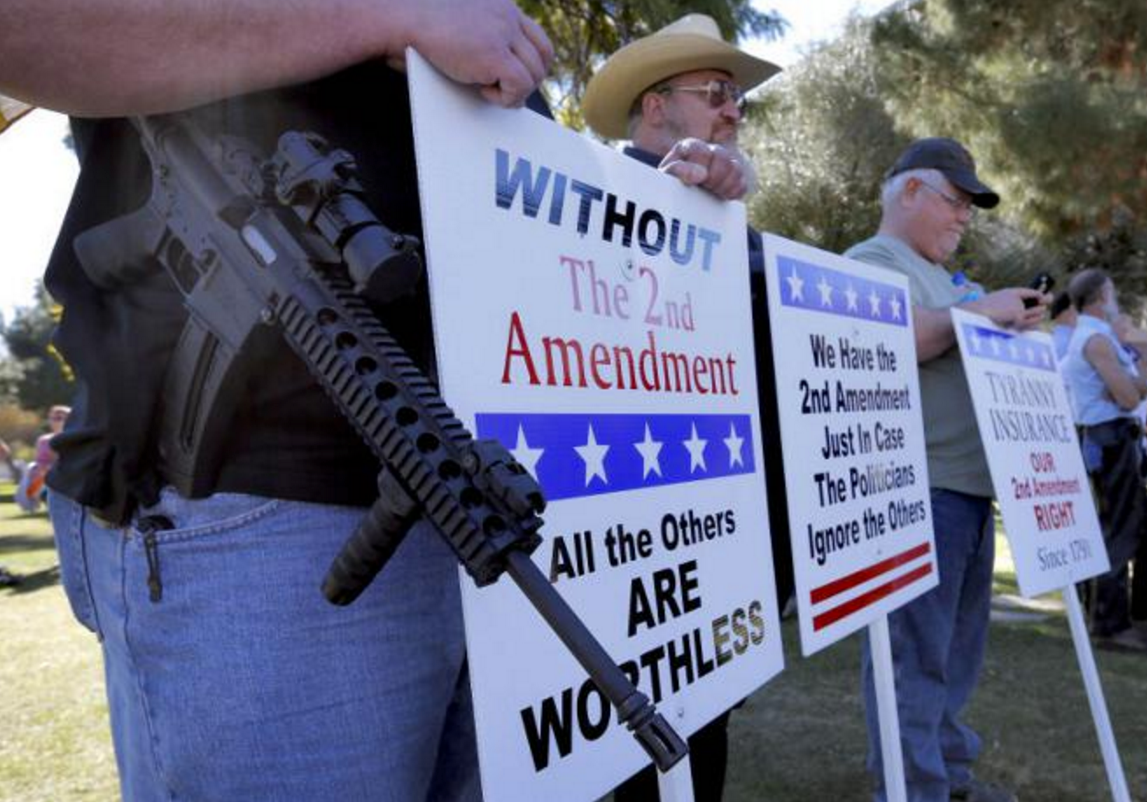 Mamas don’t let your babies grow up to be tea boys.
Mamas don’t let your babies grow up to be tea boys.
 Rubio ran for Senate in Florida as the candidate of the extremist Tea Party, not as the moderate alternative to the Tea Party.
Rubio ran for Senate in Florida as the candidate of the extremist Tea Party, not as the moderate alternative to the Tea Party.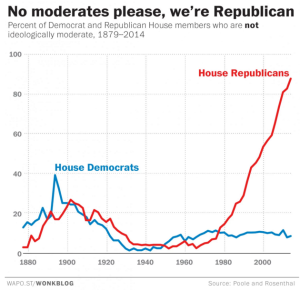 By any reasonable measure, Senator Rubio is a far-right extremist, as is Ohio Republican Governor John Kasich (88% lifetime ACU rating), who is also sometimes inaccurately labeled a moderate by simplistic pundits. Political scientists have
By any reasonable measure, Senator Rubio is a far-right extremist, as is Ohio Republican Governor John Kasich (88% lifetime ACU rating), who is also sometimes inaccurately labeled a moderate by simplistic pundits. Political scientists have  These are very scary times. Who among us does not lie awake at night worrying about dying in an elevator? I mean, what if one came crashing down while you were riding in it? Makes me shudder just thinking about it.
These are very scary times. Who among us does not lie awake at night worrying about dying in an elevator? I mean, what if one came crashing down while you were riding in it? Makes me shudder just thinking about it.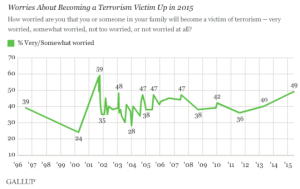 Despite this relatively low level of risk, many Americans are overcome by our fear of terrorism. Even in June 2015, well before the recent Paris and California terrorist attacks,
Despite this relatively low level of risk, many Americans are overcome by our fear of terrorism. Even in June 2015, well before the recent Paris and California terrorist attacks,  Watching the news coverage of the Republican presidential campaign, you get the feeling that there is a wave of support for the ideas of leading Republican candidates like Donald Trump, Ben Carson, Ted Cruz and Marco Rubio. For example,
Watching the news coverage of the Republican presidential campaign, you get the feeling that there is a wave of support for the ideas of leading Republican candidates like Donald Trump, Ben Carson, Ted Cruz and Marco Rubio. For example, 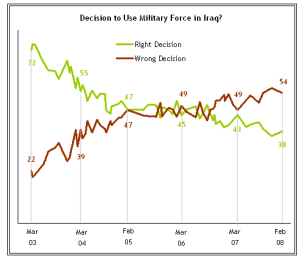 In other words, the national mood is much like when America rushed into the Iraq War in 2003.
In other words, the national mood is much like when America rushed into the Iraq War in 2003. 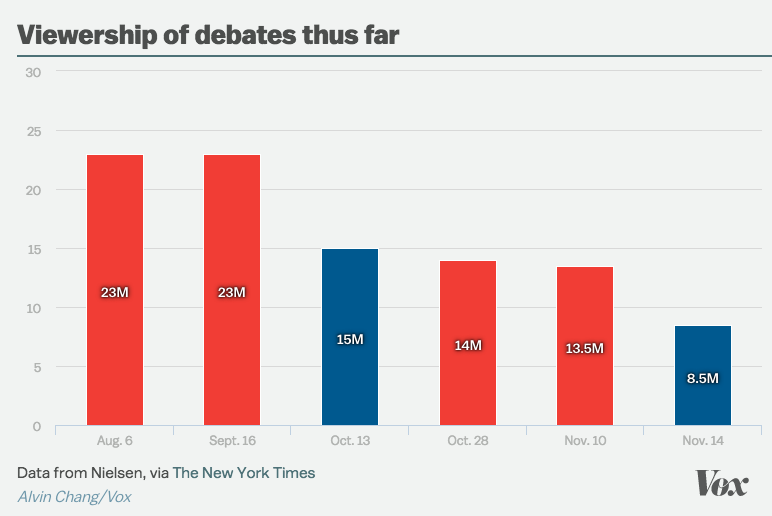
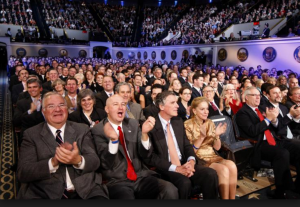 If I were a political party chair, I would make one simple adjustment to make my party more competitive. I would only allow general election swing voters to attend candidate debates.
If I were a political party chair, I would make one simple adjustment to make my party more competitive. I would only allow general election swing voters to attend candidate debates. Here’s why: Walker’s logic path quickly collapses as soon as you start connecting the dots.
Here’s why: Walker’s logic path quickly collapses as soon as you start connecting the dots.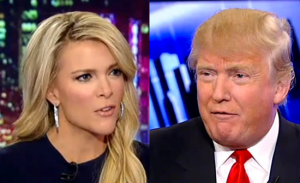 So, Donald Trump
So, Donald Trump 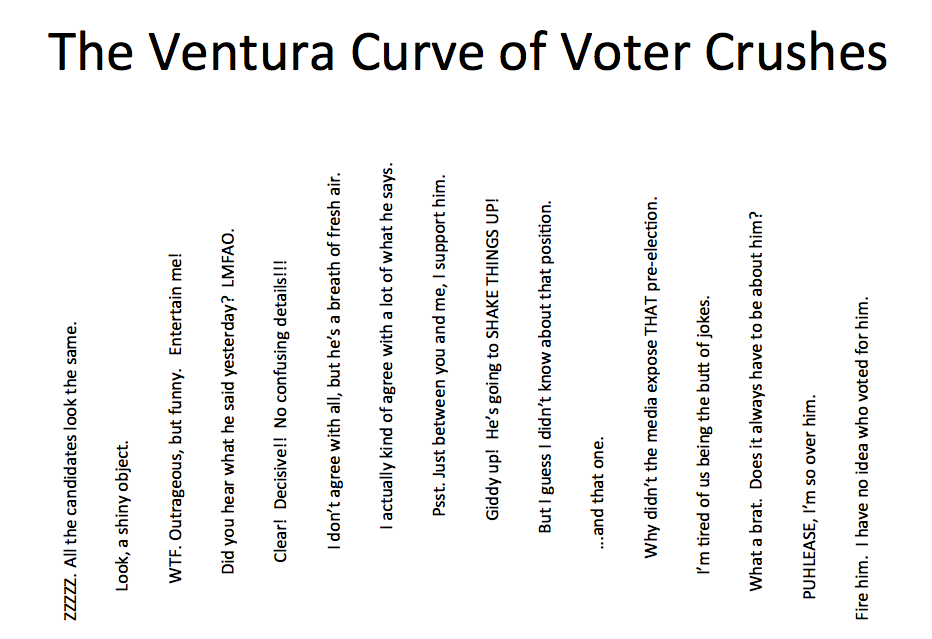
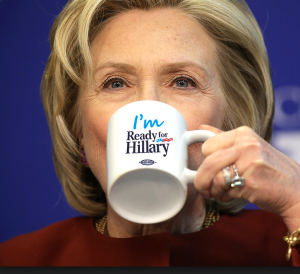 A lot of liberals I know are privately not all that sure if they are “Ready for Hillary,” as the Clinton boosters put it.
A lot of liberals I know are privately not all that sure if they are “Ready for Hillary,” as the Clinton boosters put it.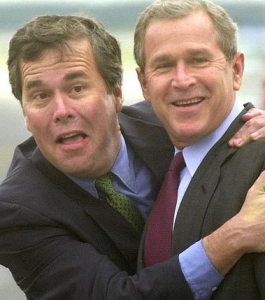 Prior to the Trump surge, Jeb Bush was being compared to his brother former-President George W. Bush, and he wasn’t managing that comparison well. He was
Prior to the Trump surge, Jeb Bush was being compared to his brother former-President George W. Bush, and he wasn’t managing that comparison well. He was 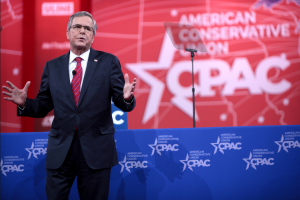 This is hardly a Republican “moderate” in the tradition of other Republican Presidents, such as Theodore Roosevelt, who was pro-union and anti-corporate monopoly, Dwight Eisenhower, who spent heavily on government-funded infrastructure and warned us about the military-industrial complex, or Richard Nixon, who created the Environmental Protection Agency and worked with Teddy Kennedy on a more generous version of Obamacare. Those are Republican moderates, not Jeb Bush.
This is hardly a Republican “moderate” in the tradition of other Republican Presidents, such as Theodore Roosevelt, who was pro-union and anti-corporate monopoly, Dwight Eisenhower, who spent heavily on government-funded infrastructure and warned us about the military-industrial complex, or Richard Nixon, who created the Environmental Protection Agency and worked with Teddy Kennedy on a more generous version of Obamacare. Those are Republican moderates, not Jeb Bush.